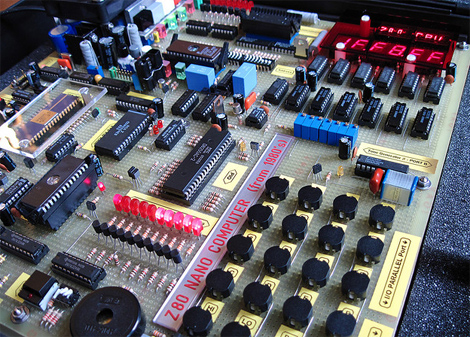
How this one missed us, we’ll never know.
[GG] built himself a retro-styled Z80 nanocomputer over two years using all 1980’s tech. Laid out on one of the largest pieces of perfboard we’ve ever seen on a project, the computer uses a vintage Z80 CPU running at 2.5MHz, 8K ROM, 16K RAM, RS-232 and Parallel ports, an EPROM burner, and an AM95 math coprocessor for 32-bit floating point arithmetic.
We’ve seen a few homebrew computers before, including a Z80 laptop, but this blows them away. For his computer, [GG] created 8BASIC, A Basic interpreter that makes best use of the six 7-segment displays and eight 16-segment displays. The display isn’t really a limitation because [GG] also put together something in Visual Basic so his PC can communicate with his nanocomputer.
[GG] even went so far as to include error detection on the ROM and RAM, as well as an on-board power supply. If you can’t admire the dedication that went into this, at least admire the great wire porn. We’re just sad [GG] never did a proper write-up of his project. He could certainly teach us all something.
Video of [GG]’s work after the jump.
[youtube=http://www.youtube.com/watch?v=5HA3dGrgC_Q&W=470]
















Damn.
I want to touch it…
On the one hand… this is fricking awesome. I mean, the dedication to understand it, the time spent on it… to design it, to assemble it, to debug it, brilliant. It’s almost a work of art.
The fact remains though that you can pretty much buy this entire SOC for something like $2. And could do so 10+ years ago.
Or buy one that is 3 – 5 orders of magnitude better for $50 or less.
So as a technical achievement, this is outstanding. It is a great learning tool. But as a practical endeavor… I have to hold back some praise.
:P Wauw, Thats what I like to build one day.
+1000…000 points and more goodies for him.
Amazing. But after all that …. Visual Basic?
@CutThroughStuffGuy
re: practical endevour
If you’d ever done a lot of work with the Z80, you’d understand how much it gets under your skin – hence all the Z80 based computers that people keep hacking up – they’re labours of love!
Wow. Just wow!
Sweet!
Video fail on HaD’s part though, the right 1/3rd of the video is cut off by the page separator!
you should figure out how to integrate just one of those little black rectangles off some modern day RAM, see what happens
zomg, that’s insane
Beautiful, admittedly not practical but who cares? Worrying about the practicality means you’ve missed the point.
Thanks to my web filtering software, I couldn’t view this page because it didn’t say pr0n. thanks alot, HaD.
What a beautiful build!
So cool.
What a neat looking project!
I always wanted to do that someday.
One strange thing I find is that a Z80 is used with none of its usual support chips (Z80 PIO, Z80 CTC, Z80 DART, etc.) and mostly Intel support chips. So no native daisy-chained, vectored hardware interrupts then?
Perfboard FTW!!!!
@CutThroughStuffGuy: Those that can, do. Those that can’t, Arduino. Glad to see you’re kinda starting to get it… kinda.
This brings memories… How beautiful!
That’s pretty similar to what I’m working on. Same displays (and more) etc… Very close. Except mine will be on a PCB (over several cards) and in a STD-bus format.
But yeah, it does get under your skin. I’ve been working with them for decades…. And I still love doing it!
Although it is literally killing me that he put 80’s and not 80s :3
@Phil – Without the “Visual” part. You can do quite a lot with Basic…
Not practical in itself, but a mighty fine addition to anyones CV….
@ jim, how does the mistake the author made made by putting “80’s” bother you so much when you claimed that it was “literally” killing you? Does anyone else see the irony in that?
infuckincredible!
THIS IS BEATIFUL!!!!!
Pure awesome. Somebody needs to put these into production.
Agreed. These kneed to be mass produced for everyday N00Bs like me to tinker with and learn a basic codeing language other than xHTML
@CutThroughStuffGuy My guess is that he wanted a Z80. It isn’t about practical. Some people like making stuff. It is probably a lot more practical to buy just about anything than to make it. I mean just how practical was the CRAY 1 built from a FPGA? It wasn’t at all but it was so cool. And if nothing else think of the pride he gets from this and what he must have learned. I would say no holding back is needed.
So does anyone know of SOC that runs CP/M?
@lwatcdr
IIRC Toshiba have/had a series of Z80 compatibles that has most of the standard external Z80 peripherals ..
http://www.mct.net/product/z80mini3.html
I think they are pretty hard to get though. I guess you could get CP/M running if you tried though. You can run a z80 emulator on a Prop and run CP/M on that though… ;)
@thread
Nice build, not sure why people are pissing their pants about it though. It’s not incredibly hard to build a little Z80 machine. His software is the impressive part, not the fact that he can solder wires to chips.
Honestly, this is a good exercise but nothing particularly amazing. Building a basic computer around a 8085 (which is quite similar to the Z80) and provide a basic OS (written in assembler) was a subject requirement when I studied for my electronics technician degree in the late 1980s. Really, it is not something too challenging. I am pretty sure that people doing engineering degrees achieved much more advanced projects.
Just anote, it’s not 2.5MHz, but 2.5 Hz (no Mega)
It actually is mega. And he’s probably underclocking it at only 2.5Mhz. 4-8Mhz is more common for a DIP Z80 afaik.